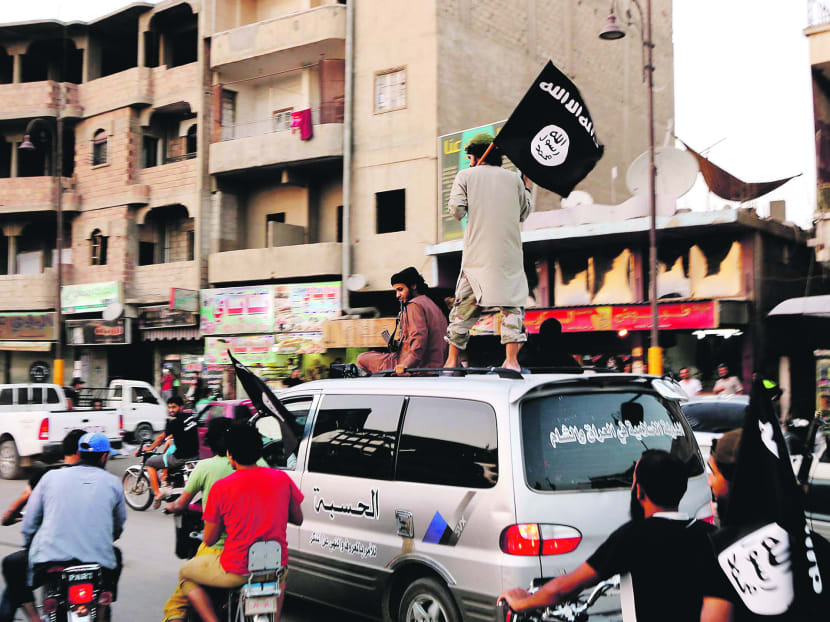ISIS declares establishment of new Caliphate
BAGHDAD — The Sunni extremist group that has seized much of Syria and Iraq has formally declared the establishment of the new Islamic State, demanding allegiance from Muslims worldwide in an alarming move condemned by regional leaders.

Following the group’s announcement on Sunday, Islamic State fighters in their northern Syrian stronghold of Raqqa paraded through the city to celebrate. Video of the celebrations was posted online and activists in the city confirmed the details. PHOTO: REUTERS
BAGHDAD — The Sunni extremist group that has seized much of Syria and Iraq has formally declared the establishment of the new Islamic State, demanding allegiance from Muslims worldwide in an alarming move condemned by regional leaders.
The Islamic State of Iraq and Syria (ISIS) now claims universal authority after it dropped the reference to Iraq and Syria in its name and said that its leader, Mr Abu Bakr Al Baghdadi, is now caliph of the Muslim world — a medieval title last widely recognised in the Ottoman Sultan deposed about 90 years ago, after World War I.
“He is the imam and caliph for Muslims everywhere,” group spokesman Abu Muhammad Al Adnani said in an online statement on Sunday, using titles that carry religious and civil power. The declaration came at the start of the holy month of Ramadan.
In Cairo, a spokesman for the Grand Mufti of Egypt dismissed the new caliphate in Iraq and Syria as an “illusion”. “ISIS’s announcement of what they called the Islamic Caliphate is merely a response to the chaos that has happened in Iraq as a direct result of the inflammation of sectarian conflict in the entire region,” said Mr Ibrahim Negm.
Through brute force and meticulous planning, ISIS has carved out a large chunk of territory that has effectively erased the border between Iraq and Syria and laid the foundations of its proto-state called the Islamic State. Along the way, it has battled Syrian rebels, Kurdish militias and the Syrian and Iraqi militaries as well as defied Baghdad’s Shia-led government backed by the United States and Iran.
Islamic State also poses a direct challenge to the global leadership of Al Qaeda, which has disowned it, and to conservative Gulf Arab Sunni rulers, who already view the group as a security threat.
Following the group’s announcement, Islamic State fighters in their northern Syrian stronghold of Raqqa paraded through the city to celebrate. Video of the celebrations was posted online and activists in the city confirmed the details.
The announcement was greeted with condemnation and even ridicule elsewhere in Syria, including from rival Islamist rebel groups who have been fighting the Islamic State since January across northern and eastern Syria.
“The gangs of Mr Al Baghdadi are living in a fantasy world. They’re delusional. They want to establish a state, but they don’t have the elements for it,” said Mr Abdel-Rahman Al Shami, a spokesman for the Army of Islam, an Islamist rebel group. “You cannot establish a state through looting, sabotage and bombing.”
Mr Qassim Atta, an Iraqi army spokesman, said declaring a caliphate could backfire by underlining the risk it posed to other nations. “I believe all countries, once they read the declaration, will change their attitudes because it orders everybody to be loyal to it.”
Fighters from ISIS overran the Iraqi city of Mosul on June 10 and have advanced towards Baghdad, prompting the despatch of US military advisers. The government of Prime Minister Nouri Maliki, with the help of Shia sectarian militias, has managed to stop the militants from reaching the capital, but security forces have been unable to take back cities they abandoned in the fighting.
The army attempted last week to take back Tikrit, but was unable to seize the city. Tikrit was the home city of Saddam Hussein, whose overthrow by US forces in 2003 ended a long history of domination by Sunnis over what is today a Shia majority in Iraq.
Professor Fawaz Gerges, a Middle East expert at the London School of Economics, said he expected the declaration to alienate ISIS’ allies. “The strategic goal of the Baathists’ (different factions of the Baath Party hold power in Syria and formerly held power in Iraq) is the capture of Baghdad, not the establishment of the caliphate. ISIS’ pronouncement will most likely intensify the intra-jihadist struggle and widen the split between ISIS and its insurgent Sunni allies in Iraq.” AGENCIES









